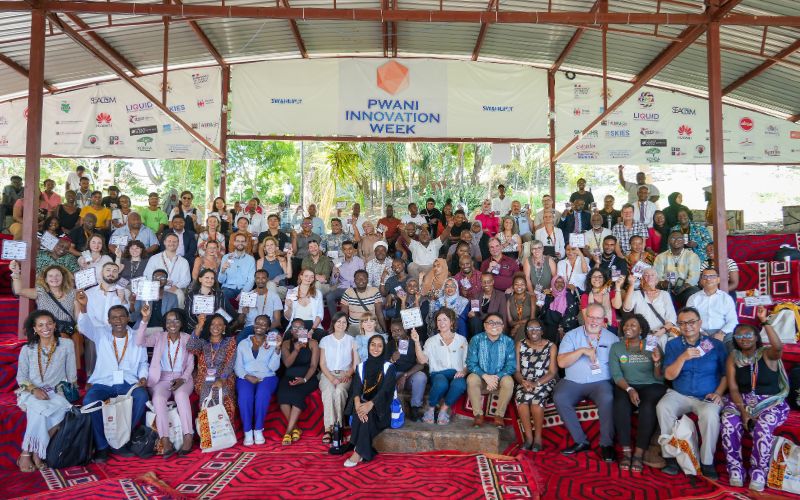ICOMOS Africa24 Conference: Conservation of Built Heritage in Africa
 From 25 to 29 November 2024, Swahilipot Hub hosted Africa24, ICOMOS’ first conference in Africa focusing on the conservation of African built heritage, in Mombasa, Kenya. The conference aimed to provide an international platform to support African indigenous and local communities and heritage professionals, foster networking, and promote the implementation of strategies to enhance global knowledge of the region’s heritage defined from an African perspective.
From 25 to 29 November 2024, Swahilipot Hub hosted Africa24, ICOMOS’ first conference in Africa focusing on the conservation of African built heritage, in Mombasa, Kenya. The conference aimed to provide an international platform to support African indigenous and local communities and heritage professionals, foster networking, and promote the implementation of strategies to enhance global knowledge of the region’s heritage defined from an African perspective.
Africa24 was organised by ICOMOS individual African expert members along with ICOMOS International Scientific Committees (ICTC, ISCCL, ICICH, ISCES, ISCEAH, CIAV), Working Groups (OCD-RBA, EPWG) and the ICOMOS Vice President representing the region. Over the week, more than 100 participants were present both onsite and online to share insights on the challenges and opportunities faced by African cultural heritage. Members of partner organisations, namely the African World Heritage Fund (AWHF), SD-WISHEES, the UNESCO Regional Office for Eastern Africa (ROEA), the National Heritage Council South Africa (NHC), the Foundation for the Preservation of Cultural Heritage in Nigeria (FOPCHEN), the Kenya Forestry Research Institute (KEFRI), the Hopewell Ceremonial Earthworks and the Philippines National Commission for UNESCO delivered presentations and some led workshops along with ICOMOS members and heritage experts. The event's key themes emphasised the need for sustainable and rights-based approaches to conservation of African built heritage, the potential of cultural tourism, and the region's vernacular architecture, cultural landscapes and intangible heritage.
The first day of the conference, moderated by Fergus Maclaren, outgoing president of ICOMOS ICTC, began with welcome remarks from Mr. Mahmoud Noor (Founder & Chief Mentor, Swahilipot Hub Foundation), followed by opening remarks from ICOMOS Director General Marie-Laure Lavenir, who emphasised the importance of fostering inclusivity within heritage practices:
Whether it is discussing the management of emblematic African sites, sharing experiences on risk preparedness – particularly in the face of climate risks – or engaging in broader reflections on post-colonial or decolonial approaches to heritage, every action we undertake together is part of the priority [to enhance representativity of heritage and achieve a balanced World Heritage List].
It was followed by presentations by the partners, namely Masanori Nagaoka (Programme Specialist for Culture, UNESCO ROEA), Precious Mothiba (Partnerships Officer, AWHF), Ivan Henares (SG Philippines UNESCO NATCOM), Emily Njeru (Kenya UNESCO NATCOM), Njeri Mbure (Marketing Manager, Hopewell Ceremonial Earthworks) and several presentations on African World Heritage sites (including a presentation on Sukur Cultural Landscapes by Ishanlosen Odiaua, outgoing President of ICOMOS Advisory Committee).
On 26 November, the conference sessions officially started with an opening ceremony led by Hossam Mahdy, President of ICOMOS CIAV, and Chilangwa Chaiwa, ICOMOS Vice-President, who highlighted the necessity of adopting a global perspective on African heritage, implementing strategies to enhance its recognition, and promoting intergenerational dialogue among African heritage professionals. On this day, speakers addressed the topics of risk preparedness, climate change, and case studies from Kenya focused on preserving and promoting diverse heritage. The sessions were moderated by Fergus Maclaren.
The third day of presentations was moderated by Maddalena Achenza, President of ICOMOS ISCEAH and Alyssa K. Barry, ICOMOS EPWG Africa Coordinator. It featured discussions on the themes of post-colonial and decolonial approaches, and the preservation of African identities.
On November 27, the sessions were moderated by Tinhinane Bachir-Cherif, ICOMOS ISCEAH Emerging Professionnals Coordinator, and focused on the use of traditional knowledge in heritage conservation, with a presentation by Hamdy El-Setouhy, winner of the 2024 ICOMOS Culture-Nature Prize. Other sessions covered the subject of youth and new technologies and their role within heritage preservation practices. The day concluded with a gala dinner hosted by Fort Jesus and the distribution of attendance certificates.
Finally, a field trip to the Sacred Mijikenda Kaya Forests World Heritage property was organised on the last day of the event.
ICOMOS extends its gratitude to all participants and partners of the Africa24 Conference which positioned Africa as a central focus of the organisation’s efforts. In the future, platforms will continue to be provided for African cultural heritage professionals and international experts to connect around a sustainable vision of African heritage preservation.
Photo credits: Swahilipot Hub
See more


